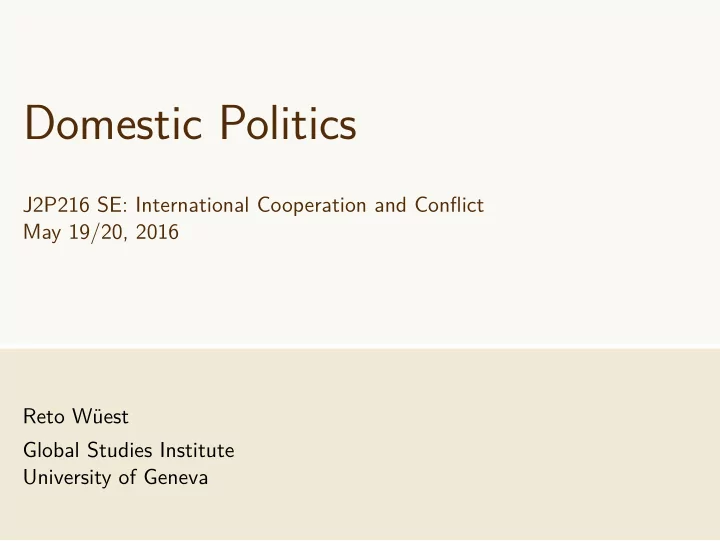

Domestic Politics J2P216 SE: International Cooperation and Conflict May 19/20, 2016 Reto Wüest Global Studies Institute University of Geneva
Outline 1 Putnam (1988) Class Presentation Discussion 2 Chiozza and Goemans (2004) Class Presentation Discussion 1/50
Class Presentation Léa to present on Putnam (1988), “Diplomacy and Domestic Politics: The Logic of Two-Level Games” 2/50
Putnam (1988): “Diplomacy and Domestic Politics” Research Question • When and how does domestic politics determine international relations, and • When and how does international relations determine domestic politics? 3/50
Putnam (1988): “Diplomacy and Domestic Politics” Domestic-International Entanglements: The State of the Art For example, • Haas (1958) emphasized the impact of parties and interest groups on the process of European integration; his notion of “spillover” recognized the feedback between domestic and international developments • Katzenstein (1978) and Krasner (1978) stressed that central decision-makers (“the state”) must be concerned simultaneously with domestic and international pressures 4/50
Putnam (1988): “Diplomacy and Domestic Politics” Domestic-International Entanglements: The State of the Art We need to move beyond the mere observation that domestic factors influence international affairs and vice versa and seek theories that integrate both spheres 5/50
Putnam (1988): “Diplomacy and Domestic Politics” Two-Level Games: A Metaphor for Domestic-International Interactions • The assumption that states are unitary actors is often misleading • International negotiations can be conceived as a two-level game: • National level: domestic groups pressure the government to adopt their preferred policies • International level: national governments seek to satisfy domestic pressure, while minimizing the adverse consequences of foreign developments 6/50
Putnam (1988): “Diplomacy and Domestic Politics” Two-Level Games: A Metaphor for Domestic-International Interactions • Each national political leader appears at both games boards • A player at the international table who is dissatisfied with the outcome may upset the game board, and a leader who fails to satisfy his fellow players at the domestic table risks being evicted from his seat 7/50
Putnam (1988): “Diplomacy and Domestic Politics” Towards a Theory of Ratification: The Importance of “Win-Sets” Suppose the following scenario • Two negotiators meet to reach an agreement, subject to the constraint that any agreement must be ratified by their constituents • Assume that negotiators have no policy preferences; they seek to achieve an agreement that will be attractive to their constituents • There are two stages: 1 Bargaining between negotiators over agreement (Level I) 2 Discussion within each group of constituents about whether to ratify (“voting” up or down) the agreement (Level II) 8/50
Putnam (1988): “Diplomacy and Domestic Politics” Towards a Theory of Ratification: The Importance of “Win-Sets” • Define the “win-set” for a given Level II constituency as the set of all possible Level I agreements that would “win” when voted up or down by constituents • Agreement is only possible if the win-sets of the two parties overlap • Ceteris paribus, larger win-sets make Level I agreement more likely (as larger win-sets are more likely to overlap) • Conversely, the smaller the win-sets, the greater the risk that negotiations will break down 9/50
Putnam (1988): “Diplomacy and Domestic Politics” Towards a Theory of Ratification: The Importance of “Win-Sets” • Distinction between voluntary and involuntary defection • Voluntary defection: reneging by a rational player in the absence of enforceable contracts • Involuntary defection: player who is unable to deliver on a promise because of failed ratification 10/50
Putnam (1988): “Diplomacy and Domestic Politics” Towards a Theory of Ratification: The Importance of “Win-Sets” • In any two-level game, the credibility of an official commitment may be low, even if the reputational costs of reneging are high, if the negotiator is unable to guarantee ratification • In some cases it may be difficult, both for the other side and for outside analysts, to distinguish voluntary and involuntary defection, particularly since a strategic negotiator might misrepresent voluntary defection as involuntary • To return to the issue of win-sets: the smaller the win-sets, the greater the risk of involuntary defection 11/50
Putnam (1988): “Diplomacy and Domestic Politics” Towards a Theory of Ratification: The Importance of “Win-Sets” • The larger the perceived win-set of a negotiator, the more he can be “pushed around” by other Level I negotiators • Conversely, a small domestic win-set can be a bargaining advantage, in the sense of: “I’d like to accept your proposal, but I could never get it accepted at home” • To forestall such strategic maneuvering, opponents may demand that a negotiator ensure himself “negotiating room” at Level II before opening the Level I negotiations 12/50
Recommend
More recommend